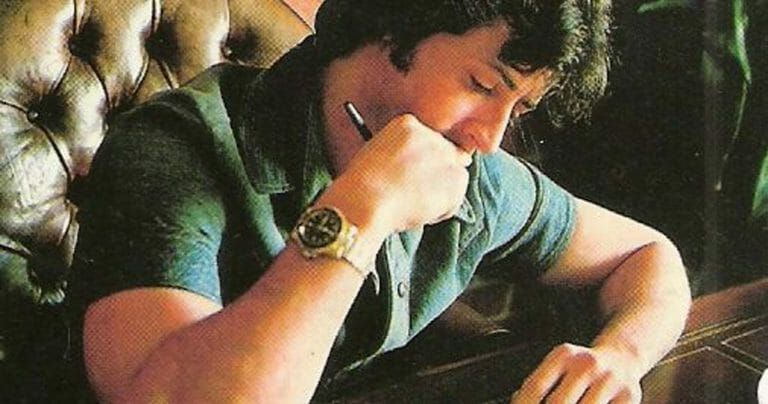By Ken Miyamoto · September 30, 2019

Sylvester Stallone offers some excellent advice about how to write first drafts.
Welcome to our ongoing Learning from the Masters and Industry Insiders series where we seek out and feature excellent videos, interviews, and discussions of the art, craft, and business of screenwriting and pull the best words of wisdom, writing tips, and screenwriting advice.
Sylvester Stallone isn’t just a movie star icon. He has 23 screenwriting credits, which include all of the movies in the Rocky franchise (including Creed II, one of the spin-offs), every installment of the Rambo franchise, each Expendables movie, and nearly all of his single film action and action drama films.
Download the screenplay for CREED here for free.
Needless to say, he’s a prolific screenwriter.
Here we turn to a snippet of a 2008 interview with screen icon Sylvester Stallone, where he offers some of the best screenwriting advice on writing that very first draft.
Stallone explains that he starts by writing on a legal pad in longhand, focusing on the basic one-sentence story beats. This is how he breaks down the whole script — in story beats to start.
“I know, in my heart, that eighty percent of [the story beats] will be no good. But you’re getting through the screenplay. You’re getting it done.”
When you begin as Stallone has suggested, it’s important to know and understand that the initial work isn’t set in stone. In fact, most of it may not be any good. Most of it will likely change in the coming drafts.
But you’re laying down the general foundation of the screenplay through this process.
“I don’t believe people should look for perfection, or even fifty percent perfection, in the first draft. It’s always going to be kind of like a child scribbling. But you did it.”
Stallone believes that the true fun of writing is when the rewriting begins.
If the initial outline or rough first draft that he is talking about lays the foundation, then the rewrite is about building onto that foundation and making it into something grand.
Watch this clip to hear from the man himself.
For all the latest from The Script Lab, be sure to follow us on Twitter, Facebook, and Instagram.
And become a member of TSL 360 to enjoy the LARGEST screenwriting education content library, featuring masterclasses, deep-dive interviews, and lectures from Academy Award-winning screenwriters, TV show-runners, producers, literary managers, agents, studio executives, and leading educators – all in one place.